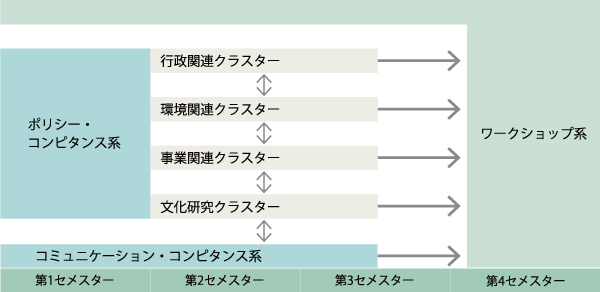Research Foundation and Characteristics
This course is based on the philosophy and policies of the School of Policy and Information Studies. The School's curriculum is broadly structured to aim at the acquisition of two basic abilities (literacies). The first is "policy literacy" and the other is "media literacy."
"Policy literacy" is difficult to learn through traditional, one-way education centered on textbooks and lectures. Rather, it can only be acquired by experiencing the process of engaging with society and daily life, identifying problems, making action plans, implementing them, and taking personal responsibility. This process requires dialogue and negotiation with the different people involved. "Policy literacy" is not simply knowledge; it is a technique that must be acquired with one's body and personality. Furthermore, "media literacy" refers to utilizing digital networks, which have emerged as a new communication infrastructure and are becoming established, to interact with different cultures, collect, accumulate, and communicate a wealth of information, and acquire the ability to express oneself effectively.
curriculum
The curriculum is based on two advanced skills, "Communication Competence" and "Policy Competence," which are an upgraded version of the two basic skills cultivated in the School of Policy and Information Studies: "Policy Literacy" and "Media Literacy." Communication competence refers to presentation skills using information technology, the ability to communicate and coordinate efficiently with others, other departments, other organizations, and institutions, as well as compliance skills in line with social trends. Policy competence subjects refer to more advanced skills in problem setting, policy and strategy planning, implementation, and evaluation.
Curriculum Features
The two types of competencies intertwine and strengthen each other, forming a double helix, and it is the common workshop subjects that facilitate their connection and integration.
Courses related to the two competency subjects are usually conducted through a combination of lectures by the instructor and reports and discussions by the students. Workshop-type courses include "exercises" and "projects." "Exercises" are thesis-guided courses. "Projects" are designed to produce realistic results under the collaborative guidance of several instructors, and address real-world issues that correspond to each of the four clusters of policy competencies.
Systems supporting practical research
Enhancement of workshop-based courses
"Workshop-type subjects," which serve to combine communication competence and policy competence, are taken throughout the entire semester.
Subjects include
(1) Seminar (master's thesis writing guidance)
(2) Projects (group instruction on real-world problems)
are placed.
Emphasis on fieldwork
In order to advance practical education and research, we will actively introduce and implement joint research with companies, local governments, NPOs, etc. in classes such as "Fieldwork and Research Methods" and projects.
Holding research presentations
The results of projects and seminars are presented at research presentations attended by all graduate students and supervisors. The results are also made widely available to other graduate schools and faculties, aiming to improve the quality of research.
Through the curriculum structure described above, this course not only cultivates practical researchers with a cross-disciplinary orientation, but also produces a new type of highly skilled professional who can contribute to solving various difficult problems of the next generation.
About course enrollment
Course enrollment and earned credits
Graduate students choose one cluster from the four policy competence clusters (Administration, Environment, Business, and Cultural Studies) that best suits their future career path and research theme, and then select and take courses from the cluster's courses, as well as the other three clusters, communication competence courses, and workshop courses. They are required to earn at least 30 credits.
Master's thesis guidance
Master's thesis supervision is provided from the second to fourth semesters. To ensure that students have a broad perspective on their research, we employ a group (multiple faculty) supervision system consisting of a supervisor and several co-supervisors.
This allows graduate students to receive multifaceted guidance on their research themes and conduct practical research.
